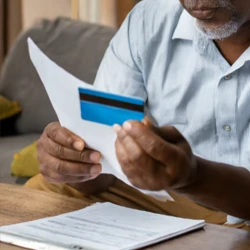Our elderly family members can sometimes be vulnerable to financial exploitation, and it's important to be aware of this issue.
As a legal attorney with years of experience in dealing with elderly financial abuse cases, I will explore the various facets of elder financial abuse, discuss tips on how to spot the financial abuse of older people and provide guidance on preventing and reporting potential cases.
By understanding the intricacies of elder financial abuse, we can empower ourselves to take appropriate action and shield our loved ones from financial harm.
Quick Summary
- Identifying signs of financial exploitation, such as unusual banking activity and unexplained transfers, can help protect the elderly from elder financial abuse.
- Establishing a trusted support network of family, friends, and mentors is essential to ensure the elderly person is protected from financial exploitation.
- Reporting suspected elder financial abuse to Adult Protective Services or law enforcement is important in protecting vulnerable adults from abuse.
What Does Elder Financial Abuse Look Like?
Elder financial abuse can look like unauthorized transactions on an elderly person's credit cards or outright theft of their assets.
It is a devastating and all too common problem involving the unlawful or unauthorized utilization of an elderly person's funds, property, or resources.
What Is Elder Abuse?

Financial elder abuse occurs when an individual exploits an older person's money, property, or assets.
These individuals are often people they know and trust, such as family members, caregivers, or financial professionals.
The motivations behind such abuse are rooted in a disregard for the trust and well-being of the older person in favor of personal financial gain.
To prove elder financial abuse, you must gather evidence and report the suspected abuse to the appropriate authorities.
7 Signs Of Elder Financial Abuse
Numerous red flags can indicate elder financial abuse. We can shield these signs from elder financial exploitation by identifying them and responding appropriately.
1. Unusual Banking Activity
Unusual banking activity is a major red flag regarding elder financial abuse [2]. This can include suspicious transactions or behavior patterns that deviate from a customer's known financial profile or lack a discernible source or business purpose.
Financial institutions, such as banks and credit unions, closely monitor and report any unusual banking activity to protect customers from fraud, money laundering, and other illicit activities.
2. Unexpected Increases in Credit Card Balances

This could indicate that someone uses the elderly person's credit card without their knowledge or consent.
Large withdrawals, unexplained transfers, and forged signatures are all examples of suspicious financial activity that may be linked to unauthorized credit card use.
3. Insufficient Funds
Insufficient funds are when someone does not have enough money to cover a transaction or payment. This can indicate financial abuse, as it suggests that funds are being diverted or mismanaged without the elderly's knowledge.
Bounced checks, unpaid bills, overdraft fees, and declined transactions indicate insufficient funds. Monitoring bank accounts, setting up overdraft protection, and maintaining a budget are key steps to avoid this situation.
4. Large Withdrawals

These withdrawals may be made without the knowledge or consent of the account holder and can result in financial difficulty, depletion of assets, and even insolvency.
When identifying large withdrawals, one should look for unusual banking activity, elevated credit card balances, inadequate funds, unexplained transfers, and other suspicious financial behavior.
5. Unexplained Transfers
Unexplained transfers are financial transactions without a clear and legitimate explanation for their purpose or origin. These transfers may involve substantial sums of money and can occur through multiple bank accounts or different currencies without a valid rationale.
Financial abuse may be indicated by:
- Unexplained transfers, which could be a sign of financial fraud
- Large withdrawals
- Abrupt alterations in financial documents
- Unexpected involvement of third parties
6. Missing Benefit Checks

These payments may be diverted or stolen without the knowledge or consent of the elderly person, leading to financial hardship and other negative consequences.
Regular monitoring of the elderly person's financial accounts and contacting the appropriate government agencies to ensure receipt of benefits are important steps to safeguard against missing benefit checks.
7. Friendly Strangers
Friendly strangers who are respectful and willing to assist others, even if unfamiliar with them, can be a sign of financial abuse.
These individuals may befriend the elderly and exploit their trust for financial gain.
Being aware of any new acquaintances who attempt to become indispensable to an older person and monitoring any financial activity that may be associated with these new acquaintances are important steps to protect against friendly strangers.
Reporting elder financial abuse is crucial. Contact the appropriate authorities, such as Adult Protective Services or law enforcement.
"Social isolation and mental impairment (such as dementia or Alzheimer's disease ) are two factors. Recent studies show that nearly half of those with dementia experienced abuse or neglect. Interpersonal violence also occurs at disproportionately higher rates among adults with disabilities."
- The National Council On Ageing
How to Prevent Elder Financial Abuse?

Encouraging open communication between the elderly person and their trusted network of family, friends, and professionals is essential.
Establishing a trusted support network can help monitor financial activities and provide assistance when needed.
Financial monitoring tools, such as budgeting software and fraud alerts, can also help detect and deter potential financial abuse.
By employing these strategies, you can help protect your elderly loved ones from financial exploitation and ensure their financial well-being.
Encourage Open Communication
Creating an environment of respect, presence, and receptiveness to feedback is essential to promoting open communication.
Encourage the elderly person to discuss their financial situation openly with trusted family members and professionals, such as financial advisors, attorneys, and caregivers.
Creating a supportive atmosphere where the elderly feel comfortable discussing their financial concerns, challenges, and goals through open communication allows for more informed financial decisions and a greater sense of security.
Establish a Trusted Support Network
Protecting the elderly person from financial exploitation necessitates the establishment of a trusted support network.
This network should consist of:
- Family, including at least one trusted family member
- Friends
- Colleagues
- Mentors
These individuals can offer both emotional and practical assistance. Building strong relationships and turning to these trusted individuals in need can help provide a safety net against potential financial abuse.
In addition to emotional support, a trusted support network can help monitor financial activities and intervene if suspicious behavior is detected.
Utilize Financial Monitoring Tools
Financial monitoring tools can play a vital role in safeguarding the elderly person's finances.
These tools include:
- Accounting software
- Expense tracking systems
- Budgeting tools
- Payroll management systems
- Financial dashboards
- And more
By providing visibility into financial data, these tools can help detect suspicious activity, such as large withdrawals, unexplained transfers, or other signs of financial abuse.
Reporting Suspected Elder Financial Abuse
Should you suspect elder financial abuse, immediately reporting the potential abuse case to the appropriate authorities is crucial. By reporting suspected financial abuse, you can help safeguard vulnerable adults from further harm and assist law enforcement in investigating and prosecuting those responsible for elder financial abuse.
Contacting Adult Protective Services

Should you suspect elder financial abuse, reporting the situation to your local APS office or calling the national hotline at 1-800-677-1116 is important.
Filing a report with APS involves providing details about the alleged abuse, neglect, or exploitation, including the name and contact information of the alleged abuser, the name and contact information of the victim, and any other pertinent information.
Reporting suspected elder financial abuse to APS can help protect the elderly person from further harm and ensure that the appropriate steps are taken to address the situation.
Involving Law Enforcement
Besides contacting Adult Protective Services, involving law enforcement is crucial if you suspect financial abuse of an elderly person.
Filing a police report, providing evidence of the abuse, and cooperating with law enforcement officials during the investigation can help hold the perpetrators accountable and protect the elderly person from further harm.
Depending on the severity of the abuse, local police may take additional steps such as interviewing witnesses, obtaining search warrants, and making arrests.
By involving law enforcement, you can help ensure that justice is served and that the elderly person's rights are protected.
FAQs
Who Are The Common Perpetrators of Elder Financial Abuse?
The common perpetrators of elder financial abuse include family members, caregivers, or strangers. Both relatives and external perpetrators may be motivated by financial gain at the expense of the elderly person's trust and well-being.
What Should You Do If You Suspect Financial Abuse?
If you suspect financial abuse, you should contact Adult Protective Services or law enforcement. You may also consider consulting a lawyer specializing in elder abuse cases. By taking action to report elder financial abuse, you can help protect the elderly person from further harm and ensure that the appropriate steps are taken to address the situation.
What Is The Most Common Method Of Identifying Elder Abuse?
The most common method of identifying elder abuse is to observe indications of financial exploitation, such as sudden changes in financial documents, large withdrawals, or unexplained transfers.
If You Are A Victim Of Elder Financial Abuse, Contact Our Lawyers Today
Suppose you or someone you know has fallen victim to elder financial abuse. In that case, it's essential to seek legal support from knowledgeable attorneys who can safeguard your rights and assist in recovering lost assets.
At Schmidt & Clark, LLP we have lawyers who specialize in cases of elder financial abuse and can provide the necessary legal guidance and support to address your situation effectively.
Contact us for a free consultation to connect with a qualified elder financial abuse attorney.
References:
- https://www.betterhealth.vic.gov.au/health/servicesandsupport/elder-abuse#:~:text=Elder%20abuse%20is%20any%20act,a%20form%20of%20family%20violence.
- https://www.justice.gov/elderjustice/red-flags-elder-abuse
- https://www.consumerfinance.gov/consumer-tools/educator-tools/resources-for-older-adults/reporting-elder-financial-abuse-guide/

 Published by
Published by 


